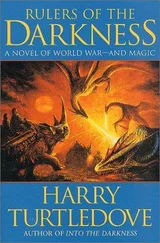Brivibas looked down at his hands. They were pale and soft and smooth; the only callus he had was by the nail of his right middle finger: a writer’s callus. He turned to Vanai. “Take care of my books, if you possibly can—and of yourself, of course.” In character to the last, she thought—books first, then her. Before she could say anything, Brivibas nodded to Major Spinello. “I am ready.”
Spinello and the soldiers led him away. He did not look back at Vanai, who stood in the doorway. The Algarvian major did look back. Just before he and Brivibas and the troopers turned a corner, he waved gaily to her. Then they were gone.
She stood there for another couple of minutes, letting heat leak out of the house through the open door, before she finally closed it. The chill around her heart made the weather hardly worth noticing. She didn’t know exactly how old her grandfather was, but he had to be up past sixty. He’d never done a day’s labor—not the kind of labor Spinello was talking about—in his life. How long would he, how long could he, last? Not long. She was sure of that.
There had been times—more than a few of them—when she wished he would go away and leave her alone and not bother her again. Now he was gone. The house they’d shared since she was tiny seemed much too big and much too empty without him. She wandered aimlessly from room to room.
Eventually, long after she took her midday meal most days, she realized she was hungry. She ate some bread and some dried figs, having no energy to make anything more ambitious. For supper, she started a thick soup with barley and what little sausage she found in the larder. She had no appetite, but her grandfather would be hungry.
Brivibas came home almost two hours later than she thought he would. She’d never seen him so filthy in all her life, nor half so worn. Most of his fingernails were broken; they all had black crescents ground under them. His palms were nothing but blisters and blood.
Vanai took one look at him and burst into tears. “There, there, my granddaughter,” he said in what she heard for the first time as an old man’s voice, brittle as dry grass. “Spinello thinks his logic keen, but it shall not persuade me.”
“Eat,” Vanai said, as he had so often said to her. Eat he did, and lustily, but he fell asleep a little more than halfway through the bowl of soup. Vanai shook him, but he would not wake. Had he not been breathing, she would have wondered if he was dead.
At last, she managed to rouse him and half carry him to the bedroom. “I must be up and away from here before sunrise tomorrow,” he said, his voice distant but clear. Vanai violently shook her head. “Oh, but I must,” Brivibas insisted. “I rely on you for it: if I am not, they will beat me and I shall have to labor anyhow. I rely on you, my granddaughter. You must not fail me.”
Through tears, Vanai said, “I obey, my grandfather,” and then, because she could not help herself, “Wouldn’t it be easier to give Spinello, curse him, what he wants from you?”
“Easier? No doubt.” Brivibas yawned enormously. “But it would be wrong.” His head hit the pillow. His eyes closed. He began to snore.
Vanai felt like a murderer when she woke him the next morning. He thanked her, which only made things worse. She gave him the remains of the evening’s soup for breakfast and bread and cheese and dried mushrooms—some from Ealstan’s basket—to eat while he worked. And then he was off, and she was alone in a house where the wind rattling a shutter was enough to make her leap in the air like a startled cat.
He came back late again that night, and the next one, and the next. Every day of labor seemed to age him a month, and he had not so very many months to spare. “It gets easier as I grow accustomed to it,” he would say, but it was a lie. Vanai knew it. Every day, the flesh thinned on his face, until she thought it was a staring skull that looked back at her out of bright blue eyes and spoke pedantic reassurances that did not reassure.
One morning after he staggered off, Vanai stood stock-still, as if a mage had suddenly made her into marble. I know what I have to do. The realization held an almost mystical clarity and certainty.
But it would be wrong. Brivibas’s sleep-sodden voice sounded inside her head.
“I don’t care,” she said aloud, as if her grandfather were there to argue with her. It wasn’t quite true. But she knew what was more important to her, and what less. If she could win the one, what did the other matter?
In that house, finding paper and pen was a matter of a moment. She knew what she wanted to say, and said it. The purity of the Kaunian she used would have brought a nod of approval from her grandfather, regardless of what he thought of certain other aspects of the note.
After she’d folded the paper on herself and sealed it with wax and her grandfather’s seal, she threw on a cloak and carried the note to the Forthwegian barrister’s home where the Algarvians made their headquarters in Oyngestun. She left it there, with a sergeant who leered at her and ran a red, red tongue over his lips. She fled.
“Still a whore for the redheads,” a Kaunian woman hissed at her. She hung her head and hurried back to her home. There she waited, and waited, and waited. Nothing out of the ordinary happened the next day, or the day after that. Each morning, before first light, Brivibas shambled off to labor for the Algarvians. Each morning, he was more a crumbling ruin of the man he had been.
In the middle of the afternoon on the third day, the knock Vanai had been waiting for, the knock she recognized, came. She started, spilling some of the peas she’d been putting into water to soak. Even though she’d been waiting for that knock, she moved toward the door with the slow, reluctant steps she might have taken in a bad dream. If I don’t answer, he will think I am not at home, and go away, went through her mind. But so did another thought; if I don’t answer, my grandfather will surely die.
She opened the door. Major Spinello stood there, as she’d known he would. He bowed to her. “I greet you, my lady Vanai. May I come in?”
His formality surprised her. Had he got the note? He had. Oh, he had.
She saw it in his eyes. “Aye,” she whispered, and stood aside to let him.
He closed and barred the door. That done, he turned to her. “Did you know what you were saying when you said you would do anything to keep your worthless old grandfather from going off and doing what he should have been doing this past year and more?” he asked.
“Aye,” Vanai whispered again, even lower this time. She looked at the floor to keep from looking at Spinello. Again to her surprise, he waited to see if she would say more. After a moment, she did: “He is all I have.”
“Not all.” The Algarvian shook his head. “Oh, no, my dear, not all.” He stretched out a hand and undid the three wooden toggles that closed the neck of her tunic, then reached down to the hem and pulled it up over her head. Hating him, hating herself more, she raised her arms to help him. He looked at her for what felt like forever. “Brivibas is very far from all you have.” He reached out again. This time, his hands stroked bare flesh.
He surprised her once more by not mauling her. His touch was knowing, assured. Had she freely chosen him, she might—she thought she would—have enjoyed it. As things were, she stood still and endured.
“To your bedchamber, then,” he said after a while. Vanai nodded, thinking it would be easier there than on the floor, where she’d more than half expected him to drag her down. Pausing only to pick up her tunic, she took him where he wanted to go.
The bed would be narrow for two. The bed was none too wide for her alone. She waited beside it. If he wanted her out of her trousers, he would have to take her out of them. He did, and seemed to enjoy the doing. Then, amazingly fast, he undressed himself. She looked away. She knew how a man was made. She did not want to be reminded.
Читать дальше












